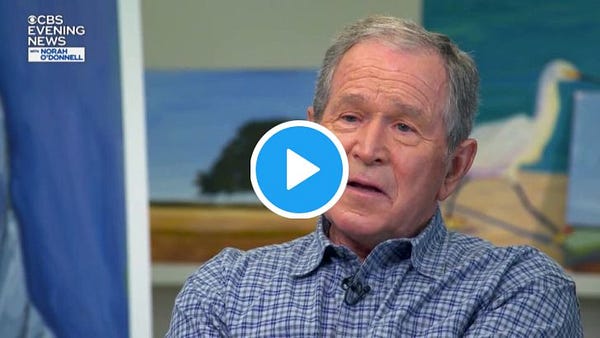Saul Bellow used to describe certain people as “contrast gainers.” That is to say, they were unimpressive in themselves but had the good fortune to be juxtaposed to rivals who were even worse. George W. Bush is one of the greatest contrast gainers of all time. He ended his presidency as a world-historical disaster, having overseen one massive failure after the next: the Iraq War, Katina, the 2008 meltdown. But Bush was lucky enough to be the immediate Republican president before Donald J. Trump, whose own failures have been nearly as epic and who possessed a political persona much more hated by the opposition. No wonder his popularity shot up in the Trump era, especially among Democrats.
As CNN noted in 2018, “George W. Bush has turned his unpopularity upside down. Six in 10 Americans, 61%, say they now have a favorable view of the 43rd President of the United States in the latest CNN poll conducted by SSRS, nearly double the 33% who gave him a favorable mark when he left the White House in January 2009.” The network added, “Most of Bush’s climb back to popularity came from Democrats and independents. His favorability mark among Democrats has soared from only 11% in February 2009 to a majority 54% now.”
Bush is making media rounds again, promoting his mediocre paintings and also, by no accident, continuing the work of refurbishing his reputation. Bush’s latest book, you see, is about immigrants to America. Obviously he likes immigrants, unlike a certain recent orange skinned president who shall remain nameless.
That remaining nameless business is quite literal. Bush has never condemned Trump by name in public, not even in 2015 and early 2016 when Trump wasn’t even the Republican nominee. Instead, Bush prefers a form of subtweeting, as in his comments on CBS This Morning that “history” will judge the January 6 insurrection or his claim to have written in Condoleezza Rice’s name on the 2020 presidential ballot.


Over in New York magazine, my former colleague Sarah Jones is scorching in her indignation against the rehabilitation of Bush:
The reality of the Bush legacy is at painful odds with his post-presidential reputation. That discrepancy isn’t news. Here is what we know about Bush. Ever so eager to establish himself as the avatar of something he calls “compassionate conservatism,” he is responsible for torture and death on a mass scale. Because these abuses did not occur on American shores, did not target American citizens, the political class has decided to pretend the death does not matter. Bush has assumed the role of elder statesman, a sensible voice in a Republican party gone mad. His complicity is fading out of view.
A recent work of hagiography from CBS This Morning only affirmed Bush’s status as the foremost survivor in American politics. In an interview with Norah O’Donnell, Bush held forth at length about his painting — he was inspired by Churchill, he said — and condemned the Capitol siege, one of the simpler acts a political figure may perform. There are still compassionate conservatives, he assured O’Donnell. “Absolutely. I’m one. And I think there are a lot,” he said. He’s right, actually, in his way. Compare Bush to Donald Trump and there are certain tonal differences. Bush’s old money mannerisms do not permit him to call anyone a “bad hombre,” he did not mock anyone with a disability while campaigning, and he did not rant and rave about the fake news media.
What I would add to this is that Bush is earning his redemption on the cheap. All he has to do is not be Trump, mutter a few platitudes about national unity, and indirectly and vaguely criticize Trumpism. In terms of actually doing something to oppose Trump and Trumpism, Bush has never lifted a finger and will never do so.
Bush’s silence is sometimes excused by the made up rule that former presidents don’t criticize their successors. In reality, this rule is only ever selectively applied and is no longer operative. Jimmy Carter, Bill Clinton, and Barack Obama have all spoken against Trump and Trump himself has been vocal in criticizing Joe Biden. Further, the two Republican presidential nominees after Bush, John McCain and Mitt Romney, took real political risks in opposing Trump and in Romney’s case twice voting to convict in impeachment trials . Finally, Bush did nothing to oppose Trump before he was elected president.
Bush has been a political coward in the Trump era. There are many plausible reasons for his lack of courage. One suspects that the fact the younger members of the Bush family still have political ambitions is a factor. But this reason seems hardly exculpatory.
George H.W. Bush famously had to fight off unfair media accusations of being a wimp. Misapplied to the elder Bush, the label suits well the lesser Bush.
Scorsese’s Covid Movie
This is a very brief interview from the fall of 2020 of Martin Scorsese talking about life under lockdown. But never one to do anything by half measures, Scorsese turns the monologue into almost a short movie, a drama about resilience and acceptance.




Worth emphasizing that Bush's redemption was facilitated by Obama's (and other D leaders) warm embrace of Bush and his cronies.